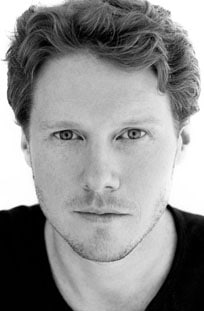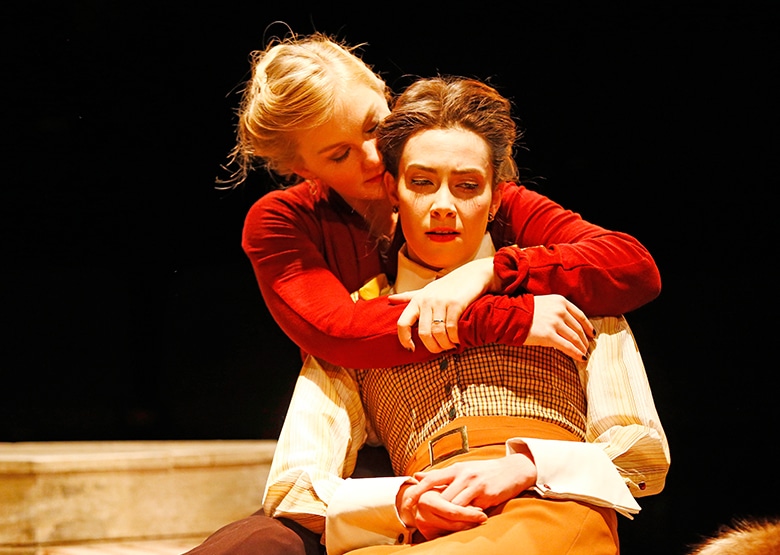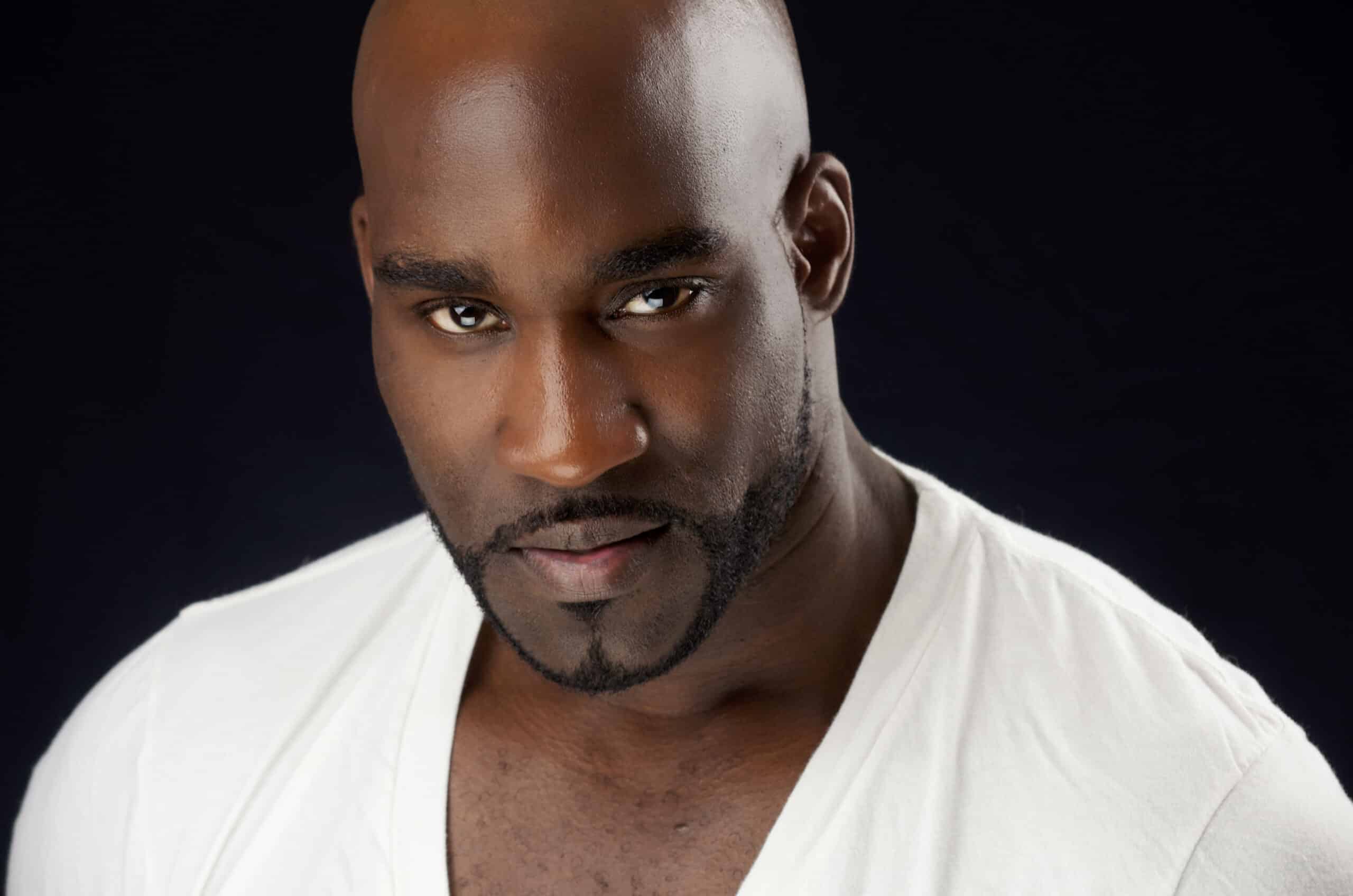by John Patrick
As soon as you enter our theatre, you are part of the performance. Not just an observer, but a participating member of the company. It’s my job to help make sure that the actors effectively invite you to collaborate in the experience of the play rather than just be a spectator.
– John Patrick, Resident Vocal Coach
 My job title, Resident Vocal Coach, is commonly used throughout American theatre, but I find the title misleading. In fact, most people assume I either teach people how to sing or that I wear athletic shorts and a whistle around my neck as I bark orders.
My job title, Resident Vocal Coach, is commonly used throughout American theatre, but I find the title misleading. In fact, most people assume I either teach people how to sing or that I wear athletic shorts and a whistle around my neck as I bark orders.
Actually, I’m responsible for the overall soundscape of the Mainstage productions you see, or rather hear, in the Paul Green Theatre. Primarily I support the director and cast’s efforts to create a play every audience member can clearly hear and understand. This includes direction of volume, accent/dialect guidance, effective speech articulation, and the clear expression of dense language. To this end, I give notes throughout the rehearsal process.
The needs of my role change drastically for each production. In Three Sisters, directed by Producing Artistic Director Vivienne Benesch, helping the actors more clearly communicate sub-text through rich Chekhovian language was paramount. Now, moving into Sweeney Todd, directed by Jen Wineman, the myriad British and European accents take up more of my focus.
An entertaining evening in the theatre requires at the bare minimum that the audience hear and understand the play. But there are depths of experience, perhaps ones we consider compelling enough to inspire communal transformation and growth, that require a different kind of vocal expression. When excess tension exists in an actor’s vocal instrument as they speak onstage, the amount of information the voice carries out into the audience is greatly reduced. What I mean by “information” is simply – resonance, harmonics, overtones and undertones – the recordable elements that make up sound. So when an amount of tension is applied to an expression that is more or less than what is required to do the job, we lose valuable information in the vocal expression.
 Arielle Yoder and Allison Altman. Photo by Jon Gardiner.
Arielle Yoder and Allison Altman. Photo by Jon Gardiner.
For example, at the peaks of the emotional journeys of Masha and Irina, two of the Three Sisters, the performances of acting company members Arielle Yoder and Allison Altman had to be sure not to lament with a tempting amount of excess tension or the audience would then feel the pain of the sister’s experiences less. This took considerable work and years of training for both actresses. In a similar vain, David St. Louis, playing the title role in Sweeney Todd, is working on a delicate balance of ferocious vocal dynamics without introducing an amount of tension that might become counter-productive to the audience’s reception of his voice. A wonderful challenge!
 David St. Louis
David St. Louis
Why this is deeply important to the viability of live theatre is relative to theories of attention. Why do we as audience members sometimes pay desperately close attention to something onstage and then at times drift, thinking of the laundry that needs washing or how we left the thermostat up too high at home? As the mind is introduced to new, robust, yet palatable information it tends to stay focused longer than when it is given less to process, especially when the information is predictable.
To prolong our attention we need: 1) rich information, 2) information we are able to process and 3) information that is hard to predict. These three ingredients combine for a beautiful concoction of suspense! Suspense is what keeps the audience’s attention throughout the majority of a play, so that they have the opportunity to be deeply affected by a production. Opposed to just being bored by a production, or even worse, apathetic to it.
A great deal of personal joy in my job comes from the pursuit of this quest – how do I help keep the audience’s attention through a prolonged state of suspense? I co-founded with Scott Miller and Liam Joynt the Miller Voice Method Studio, a think-tank to tackle this very question. I guide actors to expressions that contain as much robust information as possible in the actual sound itself so that an audience’s brains have more to process on a sonic level. This means utilizing just the right amount of tension so the voice is supported but doesn’t have its resonance and overtones diminished by overtly inefficient tension. Then I help support the actors to communicate as clearly as possible so these sounds are intelligible and palatable – this speaks to the coaching of overall volume and speech articulation. And finally, I challenge the actors not to find themselves in predictable patterns of breathing and speaking so that they are always one step ahead of the audience. Ah, suspense!
When all these Herculean tasks are accomplished, another reason why I find actors to be a special breed of super-human for whom I have deep respect, perhaps then the audience can experience the play from a transportive state of mind. It is from this place of shared transformation that we may better feel each other’s presence in the shared communal theatre space and seek to learn from each person’s unique experience. It is my job as vocal coach to encourage this phenomenon.
We at PlayMakers invite you to lean forward in your seats and hope for the virtuous possibility of a transformative experience as a community to happen during each and every performance.
Ready for just such a transformative theatre experience? Join us for the rich soundscape of Sweeney Todd March 30 through April 23.
Click here or call the Box Office at 919.962.7529 to reserve your seat!